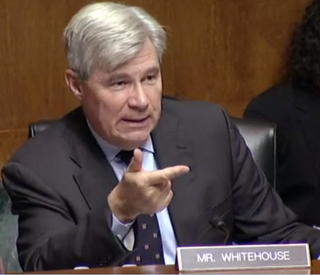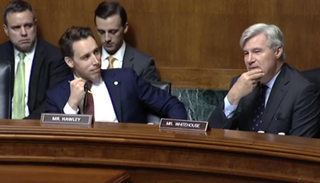Sen. Whitehouse Hammers Social Media
Sen. Sheldon Whitehouse (D-R.I.) lit into social media in general and Facebook in particular in a hearing Tuesday (Nov. 5) on Big Tech's data practices.
In that he was in bipartisan agreement with the Crime and Terrorism Subcommittee chair, Josh Hawley (R-Mo.), whose hearing title was revelatory: "How Corporations and Big Tech Leave Our Data Exposed to Criminals, China, and Other Bad Actors."

Related: Apple, Tik Tok Decline Invites to Tough Talk Tech Hearing
"Mr. chairman, I think willful blindness seems to be a theme among our platforms," he said to Hawley during the hearing. "They don't want to ask the questions because they don't want to hear the answer."
He was responding to testimony from Kara Frederick, fellow for Technology And National Security Program at the Center for a New American Security, after Whitehouse had asked her what constraints there were on a Facebook or Google, which have massive amounts of data, trying to monetize that by selling information to a company fronting for a foreign government or a government entity itself.
Frederick said the problem was there was a transparency "deficiency," so that there was not a clear picture of what data the companies were collecting. She said that the rules of the road have yet to be set and that there needed to be a public-private partnership to draft such constraints.

Whitehouse responded that when Facebook is doing "something as obvious as selling political advertisements and accepts payment in rubles, you'd think that somewhere in the genius's apparatus, somebody might have thought, "Hmm, I'm selling political ads in my home country and the payment is denominated in rubles, what might that mean," he said cuttingly, stroking his chin in mock contemplation as Hawley looked on with a smile of agreement.
Multichannel Newsletter
The smarter way to stay on top of the multichannel video marketplace. Sign up below.
"But they didn't care to look, they didn't try to look, they didn't want to look. They wanted to cash the rubles and move on."
He then said that when the "geniuses" at Facebook tried to prevent the foreign interference, they just moved it to shell corporations because they don't require those corporations to disclose "who is really behind it." Borrowing from Rocky & Bullwinkle and their Russian spy foes, Whitehouse said that if a Boris & Natasha LLC shell corporation were set up in Delaware, Facebook would "happily sell advertising time" even though it would be obvious to non-geniuses that "something is up."
Whtiehouse said it was worth the Congress' attention to try and figure out how to create the incentives so that willful blindness is "no longer a successful business model when the security of the United States is at stake."
Hawley clearly agreed.
Contributing editor John Eggerton has been an editor and/or writer on media regulation, legislation and policy for over four decades, including covering the FCC, FTC, Congress, the major media trade associations, and the federal courts. In addition to Multichannel News and Broadcasting + Cable, his work has appeared in Radio World, TV Technology, TV Fax, This Week in Consumer Electronics, Variety and the Encyclopedia Britannica.

